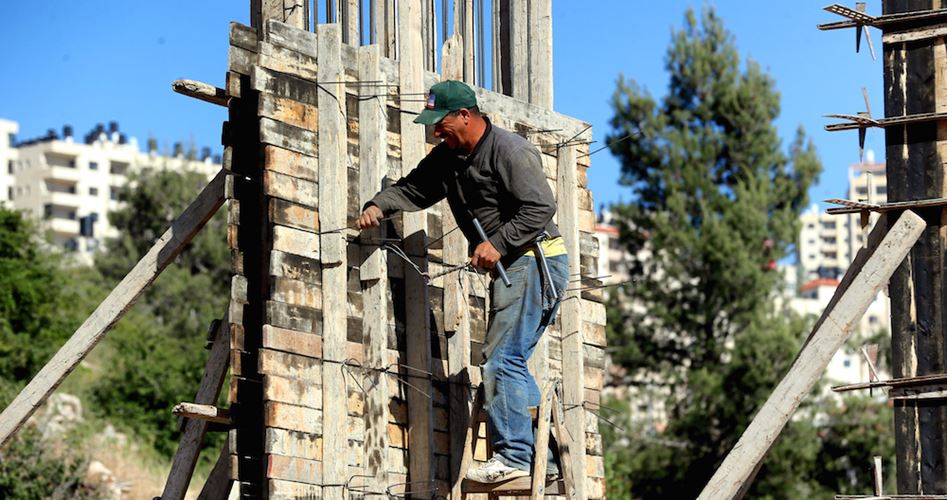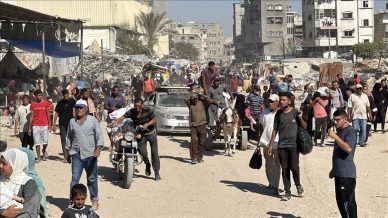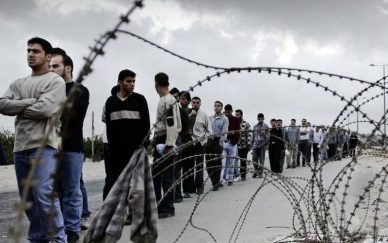Every year May Day passes without bringing about change to Palestinian workers who are trapped behind walls siege and occupation wishing to live a better and dignified life the same as the rest of the workers of the world do.
The Gaza Strip
In the Gaza Strip workers are celebrating May Day with more poverty unemployment siege and high cost of living along with the loss of their right to work which has left a tragic mark on their lives.
Workers in the Gaza Strip are living catastrophic living conditions due to the suffocating Israeli siege and the sanctions imposed by Palestinian Authority President Mahmoud Abbas on the residents of Gaza.
Fadel Al-Najjar 50 who works in the field of construction and contracting explained that his work under siege is fluctuating and temporal. He said: “We work for a few days and remain without work for months and this is related to the availability of cement in the market and its low price.”
Al-Najjar explained that he works on May Day pointing out that he is going through very difficult economic conditions despite having a good and suitable profession.
Al-Najjar supports a family of nine including 3 unemployed youths who suffer from the lack of jobs.
The economic situation in the Gaza Strip these days is the worst throughout the years of the siege. Dozens of merchants have closed their shops and a number of them have been imprisoned because they have not been able to pay the accumulated debts.
The Israeli occupation authorities have blocked the entry of about 40000 workers from the Gaza Strip into 1948 occupied Palestine some 17 years ago thus further exacerbating the unemployment crisis in the besieged enclave.
Israel has imposed a siege on the Gaza Strip since Hamas’s victory in 2006 parliamentary elections which was intensified by mid-2007 following the Movement’s complete control of the Gaza Strip.
The West Bank
Hundreds of Palestinian workers daily pile up at a gate north of Bethlehem to cross to occupied Jerusalem and 1948 occupied Palestine to work and earn a living.
Israeli soldiers at the checkpoint examine names and identities and subject citizens to security checks. Anyone who has been detained or has a son who is a detainee or a relative of a martyr or a famous resistance family is not allowed to cross and is sent back.
Workers in the West Bank earn $25 a day if there is an available work while they earn about $100 a day in occupied Jerusalem and at the Israeli settlements yet such work is soaked with blood; many workers were killed while trying to cross checkpoints or jump off the Israeli apartheid wall especially those who do not have work permits.
In light of the deterioration and decline in employment opportunities in the West Bank a report by Palestinian Central Bureau of Statistics revealed a rise in unemployment rates on the eve of the International Labor Day. The report pointed out that the unemployment rate in the Palestinian territories amounted to 27.7% by the end of 2017.
According to the Palestinian Central Bureau of Statistics the number of unemployed people in 2017 reached 364000 with 146000 in the West Bank and 218000 in the Gaza Strip. The gap in the unemployment rates between the West Bank and the Gaza Strip remains big where it reached 43.9% in the Gaza Strip compared to 17.9% in the West Bank.
The report also revealed a rise in the unemployment rates among women compared to men. This gap has increased in recent years. The rate of unemployment among males was 22.5% in 2017 while it hit 47.8% among females during the same year.
The report revealed that the participation of men in the labor force is about four times more than that of women and that the private sector is the most active sector in Palestine in terms of employment.
The number of Palestinians working in the local market is estimated at 666000 with 333000 in the West Bank 221000 in the Gaza Strip 92000 in Israel and 20000 in Israeli settlements in the West Bank.
The report revealed that 36% of Palestinians working in the private sector earn less than the minimum wage of 1450 shekels ($402) with 16.2% in the West Bank and 74% in the Gaza Strip.
Palestine is experiencing a decline in wages and income and a rise in poverty rates particularly among young couples who have been burdened with the costs of marriage without having a source of income that enables them to cover these costs.















